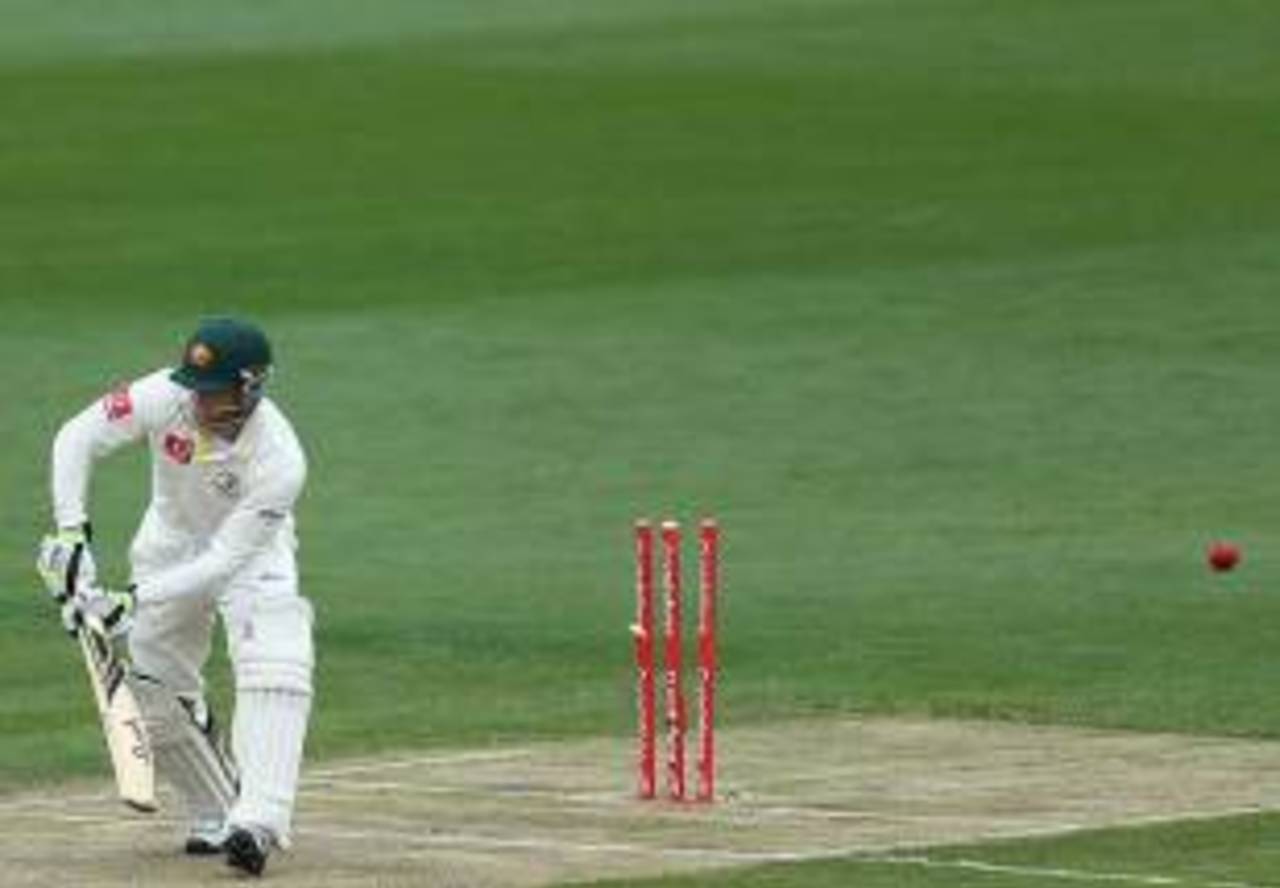Measured by the team total at the moment Michael Clarke walked to the crease, this was Australia's best start to a Test innings since David Warner went beautifully berserk
against India in Perth, 10 months and eight matches ago. Measured by the evidence of the eyes and the strength or otherwise of Sri Lanka's attack, there remains much of concern about the Australian top four.
That Australia had as many as 183 when Clarke strode to the middle of Bellerive Oval was down to the confidence and poise demonstrated by
Phillip Hughes. At 24, he has clearly benefited from changes of scene at Worcestershire and South Australia, and the selectors' careful handling of his third tilt at international cricket. There was a sense of calm and focus to Hughes that bodes well for more vexing assignments on more distant shores next year, and he looked quite happy to dictate terms at No. 3.
Less promising were the contributions of the rest of the reconfigured top four. Ed Cowan had shown a decent amount of capability against South Africa, but his first innings in a home Test was nightmarish. Warner was skittish, beaten often outside off stump and at least partly responsible for his own demise when falling to a hare-brained run-out in the over before lunch. And Shane Watson's latest move did little to change the pattern of his Test batting career, a handy start ending before it could be called substantial.
They could all draw some inspiration from the way Hughes went about his batting on the opening day of the series. Hughes' technique has improved subtly but his attitude and mindset are trending up dramatically, as evidenced by a stay that proved his ability not only to score around the wicket but also a comfort with batting at varying speeds depending on the bowling and the circumstances. The way Hughes imposed himself early after arriving at the fall of the first wicket was admirably reminiscent of Ricky Ponting, his cover drives a stinging declaration of intent and his defensive judgement sure.
Later on, as Sri Lanka corrected their line, Hughes took care not to tighten his grip or his patience, seeing out a fallow period when his runs slowed to a trickle. If he is to be a success at No. 3, Hughes must show command of all manner of innings, be they aggressive, more considered or somewhere in between. Here he struck a neat balance, showing due deference to the tidy Nuwan Kulasekara, pouncing on Chanaka Welegedara's errors in length, and not allowing himself to be tied down by Rangana Herath's left-arm spin on a pitch offering its least assistance on day one.
If there was some good fortune when he edged a Welegedara no-ball on 77, the manner of Hughes' final dismissal was cause for minor relief. For rather than falling to an angled bat snick to the slips cordon in the fashion he so tired of last summer, Hughes was beaten and bowled by the best delivery of the day. Welegedara's offering bent back enough to find a minute gap between bat and pad, and while no top-order batsman wants to be bowled, in Hughes' case there is something of the statistical ledger to be squared.
Hughes walked out to bat at the fall of Cowan's wicket, after a stay that conjured unhappy memories of what turned out to be Ponting's final Test in his home state, against New Zealand a year ago. Like Ponting then, Cowan now looked out of sorts. He very nearly fell for a first ball duck, prodding at Kulasekara only for the ball to elude the right hand of a diving Angelo Mathews. Cowan then nudged and edged for a time, and perished as he made an awful hash of an attempt to impose himself with a pull shot.
This is a series in which Cowan should be capable of scoring heavily, having risen quite suitably to the occasion for much of the South Africa series. But the thought that runs "should" be made can cloud the process of making them, and this innings was not the kind generally played by batsmen with a clear head and simple outlook. More will be expected in the second innings.
Warner also failed to convince despite a healthy enough tally, his 57 pockmarked with flirts outside off stump. Worse was the manner of its termination, a run-out is wasteful at any time but particularly in the final moments of a morning session that had up to that point reaped a sound return. Clarke's pre-match acknowledgement that Warner will always skirt the line between the magnificent and the maddening was fair, but the squandering of a platform is just that, regardless of how a batsman is cast.
Watson's ideal role is defined as something in the realm of Jacques Kallis, South Africa's prolific allrounder, who has held down a top four posting for nearly 15 years. Slipping down to No. 4 in Hobart, Watson was untroubled until the moment he was accounted for, the victim of a coruscating catch by Mahela Jayawardene. Nothing was particularly damning about Watson's innings apart from the fact that he was yet again unable to go on from a start, to make the runs his comfort at the crease suggested. No-one is more aware of this failing than Watson himself, but he is still to prove he can make use of this knowledge.
For all of that, Australia's position at the end of the day was sound, with Clarke and Michael Hussey safely entrenched. They were grateful to be given far more of a start than has been the case for almost the whole of 2012, even if the manner of its arrival was equal parts Hughes and haphazard.
Daniel Brettig is an assistant editor at ESPNcricinfo. He tweets here
